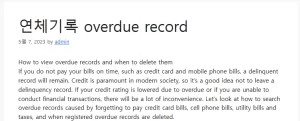How to view overdue records and when to delete them
If you do not pay your bills on time, such as credit card and mobile phone bills, a delinquent record will remain. Credit is paramount in modern society, so it’s a good idea not to leave a delinquency record. If your credit rating is lowered due to overdue or if you are unable to conduct financial transactions, there will be a lot of inconvenience. Let’s look at how to search overdue records caused by forgetting to pay credit card bills, cell phone bills, utility bills and taxes, and when registered overdue records are deleted.

index
Classification of overdue – long-term and short-term overdue 연체기록
A delinquency is a situation in which you are unable to pay your dues by the due date. If an overdue record remains, your credit rating will be lowered and you will be penalized when making financial transactions. If your credit rating goes down, it is difficult to get a loan or the interest rate becomes very high, and it becomes difficult to reduce and issue credit cards.
Overdue is divided into short overdue and long overdue. Short-term overdue is applicable when the overdue amount is KRW 300,000 or more and the overdue period is more than 30 days and less than 90 days. Long-term overdue applies when the overdue amount is KRW 1 million or more and the overdue period is over 90 days. Here, the number of overdue days is calculated as the number of business days excluding public holidays. 좋은뉴스
In the event of long-term overdue, the overdue record is registered in the debt default list of credit rating agencies and credit information agencies, and disadvantages occur in future financial transactions.
For reference, if a credit card is overdue for more than 90 days, it is considered a long-term overdue and is registered as a credit delinquent.
How to look up overdue records
Overdue records can be checked on the credit rating agency’s website. There are NICE evaluation information and All Credit, Korea’s representative new performance evaluation companies. In this article, we introduce how to view overdue records for free on the ‘NICE Jikimi’ homepage of NICE evaluation information.
NICE Jikimi can view overdue records for free up to 3 times a year. Overdue records are searched for both short and long-term overdue records.
1. Access and experience the NICE Jikimi homepage – National Credit Inquiry – National Free Credit Inquiry (Non-members) Click in the order, then click the Service Request button. You can view without registering as a member.
Explanation of how to view overdue records on the NICE Jikimi website
NICE Jikimi overdue record inquiry screen
2. Proceed with identity verification after agreeing to the required consent items, such as consent to personal information provision.
NICE Jikimi overdue record search identity verification screen
Required consent items and identity verification to view overdue records
3. After authentication, you can check the overdue record inquiry result.
NICE Jikimi overdue record inquiry result screen
Overdue record inquiry result
The way to search in All Credit is not much different from the way to search in NICE Jikimi, and you can search overdue records as a non-member.
Time of delinquency record
Overdue records do not remain for life. The timing of deletion of the overdue record varies depending on the amount and number of cases from the date on which the overdue information is released by reimbursing all overdue amounts. It is expressed as deleting the overdue record, but the exact meaning is that the overdue record remains, but the overdue record is not shared with credit rating agencies and financial institutions. In other words, the delinquency record remains, but it is not reflected in the credit rating after the delinquency record has passed.
Table of delinquency record deletion time and credit rating impact by overdue amount, overdue days, and number of overdue cases
Time to delete overdue records by overdue amount and period
For reference, tax-related delinquents, such as national and local taxes and administrative fines, are overdue by KRW 5 million, or if three or more delinquent cases occur in a year, the credit rating will be lowered regardless of the number of overdue days, and a record of overdue will remain for 5 years after repayment. It’s possible.
Credit rating rise after delinquency records deleted
Even if your delinquency record is deleted, your credit rating will not go up immediately. When past overdue records occur, credit ratings have already been lowered. Deleting overdue records does not in itself increase credit ratings. Deleting overdue records can be understood as ‘not evaluating credit ratings based on past records.’
This is because in order to raise the credit rating, there must be no overdue, and the evaluation is based on comprehensive financial transactions such as faithful repayment of loans and stable income. Therefore, in order to raise your credit rating, you must basically have no overdue payments such as various utility bills, taxes, credit cards, and communication expenses, and if you have a loan, it is recommended to repay it in good faith.
As above, we have summarized the information related to the overdue record search method and deletion. Hope this helps.